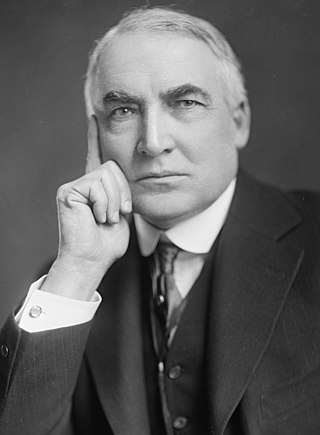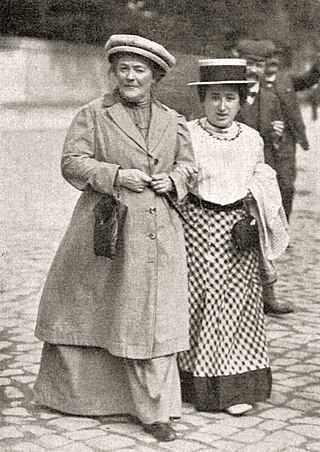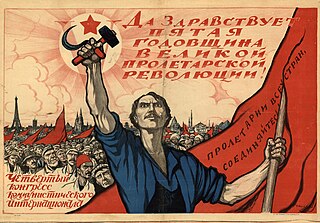Related Research Articles

The 1920 United States presidential election was the 34th quadrennial presidential election, held on Tuesday, November 2, 1920. In the first election held after the end of the First World War and the first election after the ratification of the Nineteenth Amendment, Republican Senator Warren G. Harding of Ohio defeated Democratic Governor James M. Cox of Ohio. It was also the third presidential election in which both major party candidates were registered in the same home state; the others have been in 1860, 1904, 1940, 1944, and 2016.

The Communist International (Comintern), also known as the Third International, was an international organization founded in 1919 that advocated world communism, and which was led and controlled by the Communist Party of the Soviet Union. The Comintern resolved at its Second Congress in 1920 to "struggle by all available means, including armed force, for the overthrow of the international bourgeoisie and the creation of an international soviet republic as a transition stage to the complete abolition of the state". The Comintern was preceded by the dissolution of the Second International in 1916. Vladimir Lenin and Leon Trotsky were both honorary presidents of the Communist International.

The Communist Labor Party of America (CLPA) was one of the organizational predecessors of the Communist Party USA.
Party of Revolutionary Communism was a political party in Russia 1918–1920. It was formed by a Narodnik group which broke away from the Left Socialist-Revolutionaries after the latter's mutiny in July 1918. The party favoured co-operation with the Russian Communist Party (Bolsheviks), and pledged support for soviet power. During its two-year existence the Party of Revolutionary Communism struggled with divisions, as the party sought to assert an independent pole in the midst of war communism.

The Communist Party of Byelorussia was the ruling communist party of the Byelorussian Soviet Socialist Republic, a constituent republic of the Soviet Union from 1922, that existed from 1917 to 1991.
Socialist Workers Party was a political party in the British Mandate of Palestine from 1919–1922. Its followers were known as Mopsim.
Sebald Justinus Rutgers was a Dutch Marxist theoretician and journalist who played an important role in the Left Wing Section of the Socialist Party of America. He was also a construction engineer who was active in building industry in the Soviet Union.
The 8th Congress of the Russian Communist Party (b) was held in Moscow 18–-23 March 1919. The Congress was attended by 301 voting delegates who represented 313,766 Party members. A further 102 delegates attended with speaking rights, but no vote. It elected the 8th Central Committee.

The 2nd World Congress of the Communist International was a gathering of approximately 220 voting and non-voting representatives of communist and revolutionary socialist political parties from around the world, held in Petrograd and Moscow from July 19 to August 7, 1920. The 2nd Congress is best remembered for formulating and implementing the 21 Conditions for membership in the Communist International.
The 1st Congress of the Communist International was an international gathering of communist, revolutionary socialist, and syndicalist delegates held in Moscow which established the Communist International (Comintern). The gathering, held from March 2 to 6, 1919, was attended by 51 representatives of more than two dozen countries from around Europe, North America, and Asia.
Otto Eduard Gerardus Majella Huiswoud was a Surinamese political activist who was a charter member of the Communist Party of America. Huiswoud is regarded as the first black member of the American communist movement. Huiswoud served briefly as the Communist Party's representative to the Executive Committee of the Communist International in 1922 and was a leading black Comintern functionary during the decade of the 1920s.

The Communist Women's International was launched as an autonomous offshoot of the Communist International in April 1920 for the purpose of advancing communist ideas among women. The Communist Women's International was intended to play the same role for the international women's movement that the Red Peasant International played for poor agrarians and the Red International of Labor Unions played for the international labor movement.

The Fourth International (FI), founded in 1938, is a Trotskyist international. In 1963, following a ten-year schism, the majorities of the two public factions of the Fourth International, the International Secretariat (ISFI) and the International Committee (ICFI), reunited, electing a United Secretariat of the Fourth International.
The Socialist Party of Transylvania was a political party in Romania, active primarily in Transylvania. Born out of the ethnic Romanian section of the Social Democratic Party of Hungary (MSZDP), it gradually attracted other socialist and social-democratic groups active in the Transleithanian lands of Austro-Hungary incorporated into the Kingdom of Romania after World War I. Although initially it claimed, under the title Social Democratic Party of Transylvania and Banat, the adherence of the MSZDP party sections in Banat, the latter, while maintaining close links with the Transylvania party, constituted themselves as a distinct political organization. The party also actively sought the cooperation of the socialist parties active in other regions of Romania, working towards a unified political party of the working class. Such plans were however soon thwarted by repression from the part of the Romanian authorities, as well as disagreements both inside the party and among the different socialist formations of Romania. The disagreements were further aggravated by the request of the Third International that the leaders of the party that had collaborated with the Romanian National Party be excluded from the merger, and eventually resulted in the split between the reformist social-democrats and the revolutionary-minded communists. While the former decided to retire from unification talks and re-establish an independent Transyvanian party, the latter joined the majority of Socialist Party of Romania (PSR) to create the Communist Party of Romania in May 1921. The social-democratic faction would late join the PSR members that disagreed with the new orientation of their party, founding the Romanian Social Democratic Party in 1927.

The Second International, also called the Socialist International, was an organisation of socialist and labour parties, formed on 14 July 1889 at two simultaneous Paris meetings in which delegations from twenty countries participated. The Second International continued the work of the dissolved First International, though excluding the powerful anarcho-syndicalist movement. While the international had initially declared its opposition to all warfare between European powers, most of the major European parties ultimately chose to support their respective states in World War I. After splitting into pro-Allied, pro-Central Powers, and antimilitarist factions, the international ceased to function. After the war, the remaining factions of the international went on to found the Labour and Socialist International, the International Working Union of Socialist Parties, and the Communist International.

The International Workingmen's Association (IWA), often called the First International (1864–1876), was an international organisation which aimed at uniting a variety of different left-wing socialist, social democratic, communist and anarchist groups and trade unions that were based on the working class and class struggle. It was founded in 1864 in a workmen's meeting held in St. Martin's Hall, London. Its first congress was held in 1866 in Geneva.

The Spartacus League was a Marxist revolutionary movement organized in Germany during World War I. It was founded in August 1914 as the International Group by Rosa Luxemburg, Karl Liebknecht, Clara Zetkin, and other members of the Social Democratic Party of Germany (SPD) who were dissatisfied with the party's official policies in support of the war. In 1916 it renamed itself the Spartacus Group and in 1917 joined the Independent Social Democratic Party of Germany (USPD), which had split off from the SPD as its left wing faction.

The 4th World Congress of the Communist International was an assembly of delegates to the Communist International held in Petrograd and Moscow, Soviet Russia, between November 5 and December 5, 1922. A total of 343 voting delegates from 58 countries were in attendance. The 4th World Congress is best remembered for having amplified the tactic of the United Front into a fundamental part of international Communist policy. The gathering also elected a new set of leaders to the Comintern's governing body, the Executive Committee of the Communist International (ECCI).

The Executive Committee of the Communist International, commonly known by its acronym, ECCI (Russian acronym ИККИ - for Исполнительный комитет Коммунистического интернационала), was the governing authority of the Comintern between the World Congresses of that body. The ECCI, established by the Founding Congress of the Comintern in 1919, was dissolved with the rest of the Comintern in May 1943.